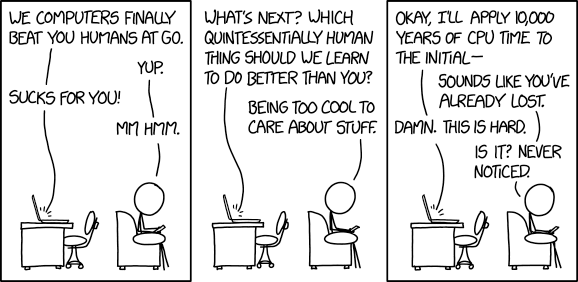Too cool to care
« previous post | next post »
Today's xkcd:
Mouseover title: "It's hard to train deep learning algorithms when most of the positive feedback they get is sarcastic."
See also Geoff Pullum, "Robots gossiping in a secret language?", Lingua Franca 8/7/2017.
In fact, I suspect that Microsoft Research might be making some progress on the "too cool to care" algorithm.
Thursday and Friday were the closing-day presentations for the 2017 JSALT Summer Workshop at CMU, where I've spent the last six weeks. I ended my segment with an indication of how far we have to go. Here's the transcript of a small piece of an ADOS ("Austism Diagnostic Observation Schedule") interview:
Interviewer: all right so next we’re just going to ask you some questions all right
Patient: mhm
Interviewer: so first what do you like doing that makes you feel happy and cheerful
Patient: writing
Interviewer: yeah
Patient : mhm
Interviewer: how do you feel when you’re happy can you describe it
Patient: I’m just very pleased
Interviewer: yeah okay what about things you’re afraid of
Patient: the dark
Interviewer: the dark
Patient: making websites also makes me happy
Interviewer: yeah
Patient: I have three ((indistinct))
Interviewer: are they all with your books
Patient: no but no one is for my book
Interviewer: mhm
Patient: actually I’m thinking about making one for another book that I’m also going to write
Here's the transcription by the IBM Watson Speech API, which tries hard to get not only the words but also the division into speakers:
Speaker 2: Alright since. The questions right. So first what do you like you can be secure happy check.
Speaker 1: Writing.
Speaker 2: Yeah. How do you feel you're happy you describe.
Speaker 1: Just leave the.
Speaker 2: Yeah.
Speaker 1: What.
Speaker 2: About things you're afraid. Dark.
Speaker 1: Website. Meet.
Speaker 2: Yeah.
Speaker 1: And. Three. I they are with your books no no one is from a book. Actually I'm thinking about making money for another book which.
Here's the transcription by the Google Cloud Speech API, which makes a stab at the word sequence but treats all input as a monologue:
questions what do you like doing that make you happy and cheerful how do you feel when your happy can you describe it I'm just very pleased what about things you're afraid of dark making websites also makes me happy free are they all with your books and now one is for my book actually I'm thinking about making one for another book
And finally, Microsoft's Bing Voice Recognition offers this transcription for the same audio clip:
Happy Friday.
Clearly too cool to care.

AntC said,
August 12, 2017 @ 11:47 pm
On the which quintessentially human thing should we learn to do better than you?: being a social animal.
Even massively parallel co-ordinated machine processes seem to me in the mould of 'command and control' von Neumann architectures. Whereas social structures (like team games) allow drawing on the different strengths of different members.
Even purely cerebral linguistic activities like solving crossword puzzles go better with a varied team.
Michael Watts said,
August 13, 2017 @ 12:17 am
Even purely cerebral linguistic activities like solving crossword puzzles go better with a varied team.
That's an artifact of the crossword design, not a fact about humans.
AntC said,
August 13, 2017 @ 10:52 am
artifact of the crossword design. Oh? Then how do crosswords get designed; and what intelligence designs them? Not humans?
Let's get machine algorithms designing crosswords, then.
Idran said,
August 14, 2017 @ 12:45 am
@AntC: http://ieeexplore.ieee.org/document/4724999/?reload=true
AntC said,
August 14, 2017 @ 11:33 pm
Thanks @Idran. That looks like the simpler synonym-based clueing. I had in mind cryptic crosswords. (For which there are solvers; but no setters AFAIAA.)